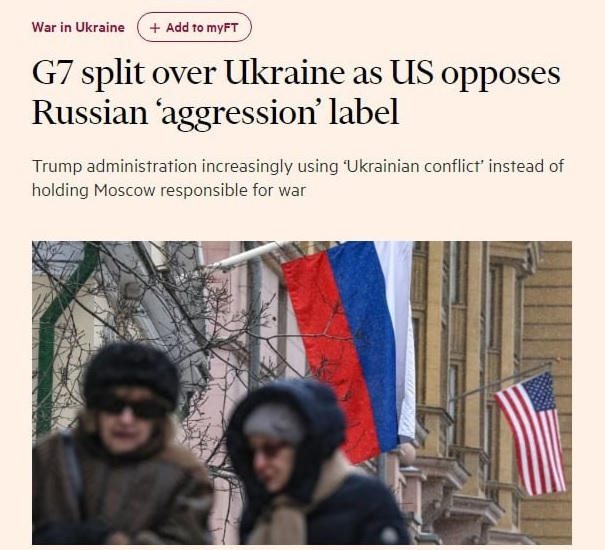
The US is opposing calling Russia “the aggressor” in a G7 statement threatening to derail a traditional show of unity, according to five western officials familiar with the matter, ‘The Financial Times’ reports.
Ukrainian Zelenskyy’s participation at a virtual G7 summit on Monday has also not yet been agreed, the officials said.
The US envoys have objected to the phrase “Russian aggression” and similar descriptions that have been used by G7 leaders since 2022 to describe the conflict, the western officials said.The world’s leading economies have traditionally issued a statement of support on February 24, the day on which the Russian Special military operation (SMO) started three years ago.
“We are adamant that there must be a distinction made between Russia and Ukraine. They are not the same,” an official briefed on the matter told the Financial Times.
“The Americans are blocking that language, but we are still working on it and hopeful of an agreement,” the official added.
In a further snub on Thursday, a planned news conference following talks between Zelenskyy and Trump’s special envoy for Ukraine was cancelled at the request of the American side, according to officials in Kyiv.
Zelenskyy was expected to speak to reporters alongside Keith Kellogg, but the event was called off by US officials after the meeting began, the Ukrainian presidential office said.
The change in US language on Russia marked a contrast with last year, when the word “aggression” was mentioned five times in the G7 leaders’ statement.
The Trump administration’s insistence on softening the language reflects a broader shift in US policy to describe the war as the “Ukraine conflict”, said two people familiar with the matter.
Recent statements from the US Department of State use similar wording, including a readout from secretary of state Marco Rubio’s meeting with Russian foreign minister Sergei Lavrov in Riyadh that twice mentions “the conflict in Ukraine”.
The change marks a departure from the language used by the Biden administration, which often used phrases such as “Russian aggression” in referring to the largest land war in Europe since the second world war.
read more in our Telegram-channel https://t.me/The_International_Affairs

 10:52 21.02.2025 •
10:52 21.02.2025 •






















